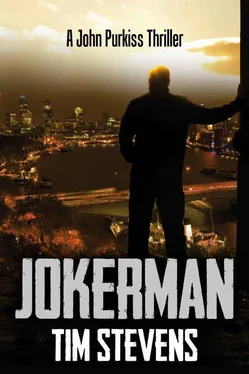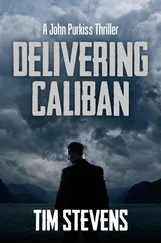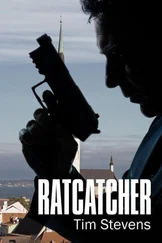Tim Stevens - Jokerman
Здесь есть возможность читать онлайн «Tim Stevens - Jokerman» весь текст электронной книги совершенно бесплатно (целиком полную версию без сокращений). В некоторых случаях можно слушать аудио, скачать через торрент в формате fb2 и присутствует краткое содержание. Год выпуска: 2013, Жанр: Триллер, на английском языке. Описание произведения, (предисловие) а так же отзывы посетителей доступны на портале библиотеки ЛибКат.
- Название:Jokerman
- Автор:
- Жанр:
- Год:2013
- ISBN:нет данных
- Рейтинг книги:4 / 5. Голосов: 1
-
Избранное:Добавить в избранное
- Отзывы:
-
Ваша оценка:
- 80
- 1
- 2
- 3
- 4
- 5
Jokerman: краткое содержание, описание и аннотация
Предлагаем к чтению аннотацию, описание, краткое содержание или предисловие (зависит от того, что написал сам автор книги «Jokerman»). Если вы не нашли необходимую информацию о книге — напишите в комментариях, мы постараемся отыскать её.
Jokerman — читать онлайн бесплатно полную книгу (весь текст) целиком
Ниже представлен текст книги, разбитый по страницам. Система сохранения места последней прочитанной страницы, позволяет с удобством читать онлайн бесплатно книгу «Jokerman», без необходимости каждый раз заново искать на чём Вы остановились. Поставьте закладку, и сможете в любой момент перейти на страницу, на которой закончили чтение.
Интервал:
Закладка:
‘John.’
‘Quentin.’
It was all they ever required for a greeting.
Purkiss let Vale set the pace, turning with him off the noisy chaos of Tottenham Court Road towards the bohemian maze of Fitzrovia. The pavements were cluttered with early lunchers eating al fresco outside the Italian restaurants and French bistros that seemed to make up every second address. Bright, young laughter rang through the streets, the city wallowing in the unusual run of fine weather that had been granted it like the smile of an indulgent god.
Yes , Purkiss thought . There’s something very wrong here.
He’d taken the call from Vale two hours earlier. Weeks, sometimes months would go by without any contact whatsoever. Then, the phone would ring, Vale would request a meeting, and Purkiss would invariably be there. Always in a public place; as far as Purkiss knew, Vale didn’t operate out of an office.
Both men were former SIS, officers of British Intelligence. Each had left the Service for reasons of his own. Vale continued to be retained by the Service in some complicated way Purkiss didn’t fully understand. The Service asked for Vale’s help when there was a problem with one of its agents. A problem which needed to be taken care of discreetly, and outside official channels, to avoid unnecessary public embarrassment.
And Purkiss was the man Vale employed to take care of the problem.
They reached Clipstone Street, the giant Telecom Tower looming ahead, and Vale began to mount a short flight of steps leading up to a boxy, nineteen sixties office-block building. It was then that Purkiss realised what was wrong.
‘You’re not smoking,’ he said.
Vale turned. ‘That’s right. I quit three weeks ago.’
‘Why?’
Purkiss had never seen Vale without a cigarette in his hand. Even indoors, he held one between his fingers, unlit. He smoked with dedication, methodically, not like a craven addict fending off withdrawal symptoms but like a man who gained something positive, even life-affirming from the act.
Vale reached the top of the steps and pressed a button. ‘Angina,’ he said.
Purkiss caught up with him, was about to ask more, when the door buzzed open.
Inside was a gloomily lit lobby, unmanned, with a pair of lifts at the far end. Vale ignored them and turned up the fire stairs to the left, as if to defy the diagnosis he’d been given. They climbed to the second floor. At the top was a glass door, unmarked. Vale pushed through, and Purkiss followed him into an oblong room with a conference table down the middle.
A woman was seated at the table, a notebook computer open before her. Also on the table were a jug of water and three glasses, one of them half full.
Purkiss recognised the woman immediately, even though he’d never met her.
She didn’t get up, but glanced at them in turn.
‘Quentin,’ she said. ‘And John Purkiss.’
Her gaze lingered on Purkiss, roving over his face, as if she was comparing him in the flesh with an image, a file, in her head.
Then she half-rose, reached across the table to shake hands. Her grip was firm, the palm slightly callused.
‘Maureen Kasabian,’ she said.
Her blue eyes were sharp, but the pouches sagged heavily beneath them. In fact her entire face, seamed and weathered, seemed to be slipping downwards, as if she’d lost weight abruptly and the skin hadn’t had a chance to catch up. Slate-coloured hair, functionally trimmed and long enough at the back to be secured in an indifferent pony tail, matched her charcoal trouser suit. The jacket was slung across the chair beside her and she was in white, rolled-up shirtsleeves.
The two men sat. Kasabian indicated the water jug, and Vale poured them each a glass.
Purkiss mentally ran through all he knew about Mo Kasabian. She must be in her early sixties, around Vale’s age, and though her face made her look older, her movements were those of a much younger, more agile woman. A law graduate from Oxford, she had been president of the Students’ Union in the early nineteen seventies, and had earned a reputation as a left-wing firebrand, leading numerous high-profile protest marches against the Vietnam war, apartheid, and British army activity in Northern Ireland. She’d been arrested more than ten times, had convictions for breach of the peace and damage to public property, and narrowly escaped prison time for assault against a police officer.
As a barrister in the nineteen eighties, she’d specialised in cases that took on the Establishment. Victims of police brutality, asylum seekers facing deportation to countries with no concept of human rights, ordinary workers made ill through corporate irresponsibility. Unlike many other lawyers of her type, Kasabian had never gone in for grandstanding, had never worked the media in a self-aggrandising way. Her success rate was better than average.
In the nineties she’d gravitated towards counter-intelligence work, prompted by her interest in exposing extreme right-wing groups. At some point — Purkiss wasn’t sure when, exactly — she’d been recruited by the Security Service. Known popularly as MI5 or just Five, and Purkiss knew even some of the organisation’s employees had started to refer to it as such, it was referred to in Purkiss’s own circles as Big Sister. The larger, better-funded service, as compared to Little Sister, or SIS, or MI6, Purkiss’s own former stamping ground.
And now Kasabian was deputy director of Big Sister. The second-in-command of MI5. One step away from the most senior counter-intelligence position in the country.
Purkiss had been inside Thames House, the Security Service’s headquarters, on one or two occasions. If he was ever going to meet the service’s deputy head, he’d expect it to be there. In a well-appointed office, with a discreet retinue of bodyguards and administrative mavens close at hand. Not here, in a featureless and seemingly deserted office a few blocks away from the West End.
‘How much have you told him?’ she asked Vale. Her voice was a lawyer’s, commanding attention without being loud. The cut-glass vowels had had some of their edges smoothed over the years, as was inevitable nowadays.
‘Nothing,’ Vale said.
‘Okay.’ She drained her glass, sat back in her chair. ‘Mr Purkiss, I realise this meeting must seem unorthodox to you. And it is, of course. I’ll explain the choice of setting in a minute.’
She hesitated a second, as if testing whether Purkiss was the kind of person to jump in with questions. He wasn’t.
Kasabian continued. ‘Yesterday morning, at nine a.m., an agent of the Security Service called Charles Morrow met the Home Secretary at a secret location near Redhill, Surrey. A country home, which several ministers of state use from time to time in order to conduct meetings where absolute security is required. Morrow had approached the Home Secretary personally two days earlier to request the meeting, bypassing the chain of command within the Service. The Home Secretary granted the request. Which indicates the intended topic of conversation was something highly sensitive.’
She paused. Purkiss had the impression of a lawyer delivering a summing-up argument to a jury, making full use of silences for effect.
‘Morrow arrived under a plainclothes Special Branch escort. Just after he got out of the car — when he was shaking hands with the Home Secretary in the forecourt, in fact — he was shot dead by a sniper. The killer was in the forest surrounding the estate, on the other side of the wall. Early forensic reports suggest he, or she, was at least half a kilometre away, possibly more.
‘By the time Special Branch started their search, the sniper was long gone, of course. So far there’s nothing. No evidence anywhere of a clue.’
Читать дальшеИнтервал:
Закладка:
Похожие книги на «Jokerman»
Представляем Вашему вниманию похожие книги на «Jokerman» списком для выбора. Мы отобрали схожую по названию и смыслу литературу в надежде предоставить читателям больше вариантов отыскать новые, интересные, ещё непрочитанные произведения.
Обсуждение, отзывы о книге «Jokerman» и просто собственные мнения читателей. Оставьте ваши комментарии, напишите, что Вы думаете о произведении, его смысле или главных героях. Укажите что конкретно понравилось, а что нет, и почему Вы так считаете.












